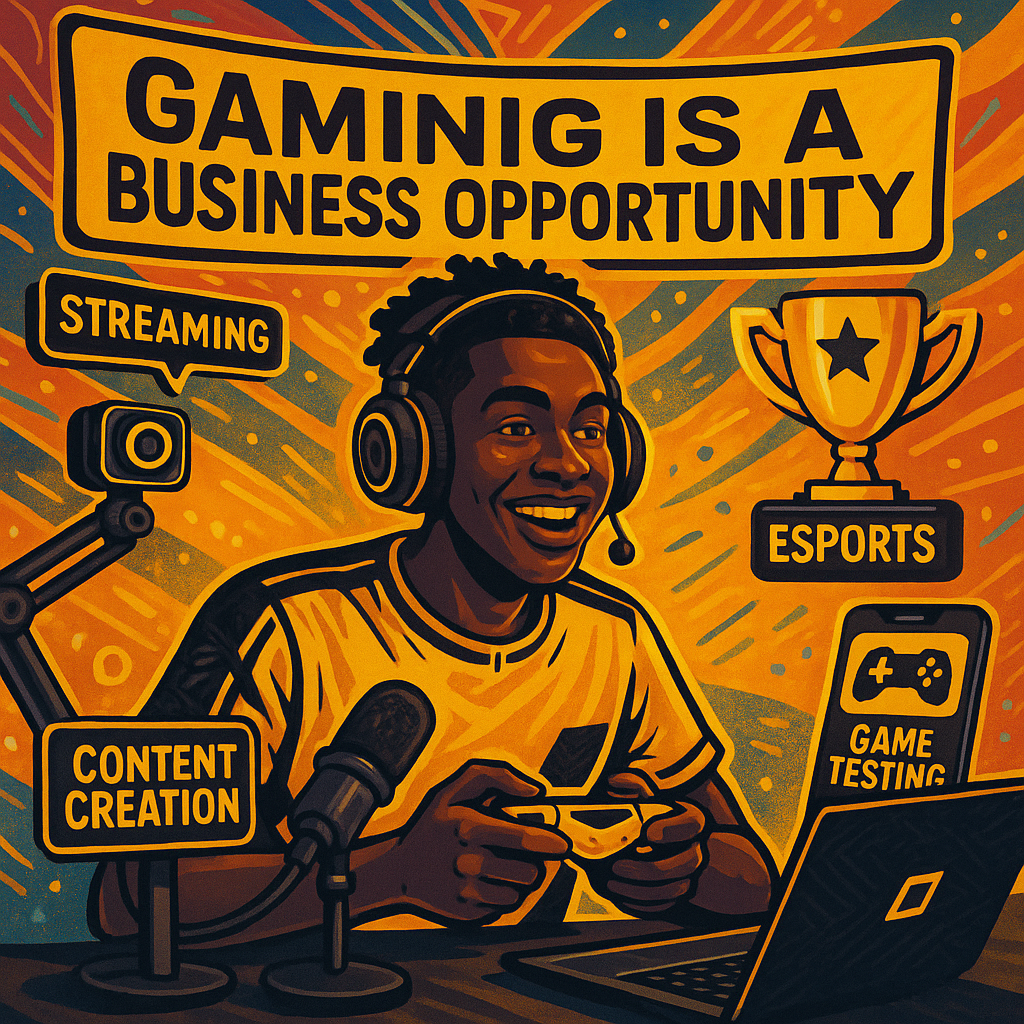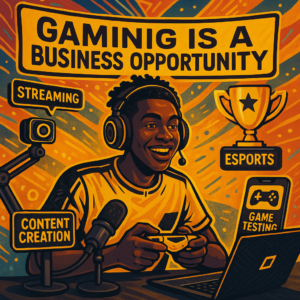From Drops to Dollars: How Players Are Making Money with Fortnite in 2025

By Jim Kiambi | Esport Africa News-Kenya

Since its explosive debut in 2017, Fortnite has evolved from a viral gaming sensation into a cultural and economic powerhouse. While many people still think of it as a game for teens doing dances and building forts. Today it offers a wide range of opportunities for players to turn their passion into profit.
With Epic Games’ ongoing investments in the Fortnite ecosystem especially through tools like Unreal Editor for Fortnite (UEFN), in-game creator monetization, and integration with creator economies players are no longer just playing for wins. They’re playing for real-world revenue. Whether you’re a casual player, competitive warrior, or a creative mastermind, here’s a comprehensive look at the many ways you can make money with Fortnite in 2025.
1. Competing in Tournaments and Events
One of the most well-known routes to making money in Fortnite is through competitive play. Tournaments hosted by Epic Games or sponsored by third parties offer prize pools ranging from a few hundred dollars to millions.
- Fortnite Champion Series (FNCS) remains the flagship competition. Each season offers multi-million-dollar prize pools, with top teams from around the world qualifying through a grueling set of open qualifiers.

- Smaller tournaments hosted by third-party organizers like ESL, Dream Hack, and community-run events offer more accessible prize pools. These often serve as stepping stones for up-and-coming players.
- In-game “Zero Build” tournaments and limited-time competitive events have also emerged, allowing non-build players to compete at a high level.
Competitive success requires not only exceptional skill but also relentless practice, a good team, and a keen understanding of game mechanics and meta changes. Still, players like Bugha (the 2019 World Cup Champion) proved it’s possible to become a millionaire by mastering the game.
2. Content Creation and Streaming
Content creation is one of the most accessible and lucrative paths into Fortnite-based income. This includes livestreaming gameplay, making YouTube videos, or posting TikToks.

- Twitch Streaming: Fortnite consistently ranks among the most-viewed games on Twitch. Players who build a loyal fan base can earn money through subscriptions, donations, sponsorships, and ad revenue.
- YouTube: Whether it’s funny moments, game tutorials, challenge runs, or lore analysis, Fortnite-related YouTube content gets millions of views. Creators earn through YouTube’s Partner Program, brand deals, and affiliate links.
- TikTok and Instagram Reels: Short-form content has massive reach potential. Creators can monetize through brand partnerships, platform creator funds, and driving traffic to paid offerings.
The key to success in content creation lies in consistency, creativity, and connecting with your audience. Many successful creators use a multi-platform strategy to maximize reach.
3. Creator Economy: Publishing Fortnite Islands

In 2023, Epic launched Creator Economy 2.0, a system allowing players to earn money from custom islands and games created in Fortnite using Unreal Editor for Fortnite (UEFN). This move turned Fortnite into a full-fledged game creation platform.
- Revenue Sharing: Epic pays creators based on engagement metrics time spent, popularity, and player retention on your island.
- Custom Experiences: Developers have recreated mini-games, full RPGs, and branded experiences (including collaborations with Nike, LEGO, and Marvel).
- Sponsorships: Some island creators also strike deals with brands to create sponsored content in exchange for direct compensation.
Players who excel at game design and storytelling can now make thousands or more by building popular islands. In 2024 alone, some creators earned over $1 million through Epic’s payouts.
4. Selling In-Game Coaching and Services
Skilled players are monetizing their expertise by offering coaching services. Whether you’re good at building, shooting, or strategic rotations, there’s likely a player who wants to learn from you.

- Coaching Platforms: Sites like Metafy, Gamer Sensei, and Fiverr allow players to offer 1-on-1 coaching, VOD reviews, or even team-based workshops.
- Hourly Rates: Coaching sessions can range from $10 to $100+ per hour, depending on skill level and reputation.
- Private Lessons and Custom Lobbies: Some players create boot camps or practice lobbies for a fee, often tied to Discord communities or Patreon.
The rise of Zero Build mode has also made the game more accessible to casual players, creating even more demand for tutoring from experienced players.
5. Cosmetic Skins and Account Flipping (with Caution)
Some players attempt to make money by flipping accounts with rare skins or cosmetics. While this practice exists, it carries significant risks:
- Epic’s Terms of Service prohibit buying and selling accounts. Accounts can be permanently banned if caught.
- Collector Market: Despite the risks, some players trade rare skins or exclusive cosmetics for cash via shady third-party sites or private Discord servers.
- Safer Alternatives: Instead of account sales, some creators build “showcase” accounts on YouTube or TikTok showing rare cosmetics to earn followers and then monetize through brand deals.
If you’re considering this route, tread carefully and consider alternative ways to showcase rare collections without violating Epic’s terms.
6. Designing Fortnite Skins and Assets (Official and Unofficial)

While most players can’t design skins directly for Epic, artists and 3D modelers can still find opportunities:
- Fan Art and Concepts: Popular Fortnite concept artists often get featured by the community. A few (like @D3NNI_yt) have even seen their concepts officially adopted by Epic Games.
- Freelancing: Many aspiring artists and designers sell Fortnite-themed overlays, thumbnails, and animations to streamers or YouTubers.
- Digital Merch: Selling Fortnite-themed digital products—like custom wallpapers, emotes, or creative UEFN props—has grown in niche marketplaces.
If you’re an artist with a flair for stylized design, Fortnite’s massive visual culture is fertile ground for creative monetization.
7. Brand Partnerships and Sponsorships
Once a player or creator builds a sizeable audience, sponsorships can provide a major revenue stream.
- Gaming Brands: Controllers, headsets, keyboards, and other gear brands often partner with Fortnite influencers to reach new customers.
- Non-Gaming Sponsors: Apparel companies, energy drinks, and even banks have started sponsoring Fortnite streamers due to their massive reach among Gen Z and Gen Alpha audiences.
- In-Game Events: Brands sometimes collaborate with popular creators to host in-game events or island launches, with compensation involved.
The synergy between Fortnite’s metaverse aspirations and real-world marketing opens up vast partnership opportunities for influencers and creators.
8. Merchandising and Brand Building
Fortnite creators with a loyal following are launching their own merchandise shirts, hoodies, mugs, posters, and more.
- Print-on-Demand Stores: Platforms like Teespring and Fourthwall allow creators to launch custom stores with minimal startup cost.
- Brand Expansion: Some streamers turn their Fortnite fame into broader personal brands launching podcasts, NFTs (with varying success), or even music careers.
This monetization strategy often complements content creation, helping diversify income and solidify long-term branding.
9. Affiliate Programs and Creator Codes

Epic Games operates a Support-A-Creator (SAC) program, where approved creators get a small cut whenever players use their code to make purchases in the Fortnite Item Shop or Epic Games Store.
- Earnings: While the cut is modest (usually 5%), high-volume creators can earn a steady income.
- Cross-Promotion: SAC codes can be promoted via YouTube, Twitch, Twitter, or even in custom Fortnite islands.
- Limitations: You must meet certain follower thresholds to qualify (e.g., 1,000+ followers on a social media platform).
It’s not a get-rich-quick method, but for active creators with engaged audiences, it provides a nice revenue supplement.
Fortnite has matured into more than just a game. It’s a platform, a marketplace, and in many cases, a launching pad for full-time careers. Players are becoming developers. Casual streamers are growing into entertainment brands. Kids earning a few bucks for skins are becoming small business owners.
While not every route is easy and success requires work, consistency, and strategy the opportunity to turn Fortnite into a source of income has never been greater.
As the lines between gaming, content, and commerce continue to blur, one thing is clear: in the world of Fortnite, victory isn’t just about the last man standing. It’s about finding creative ways to build your own empire.





